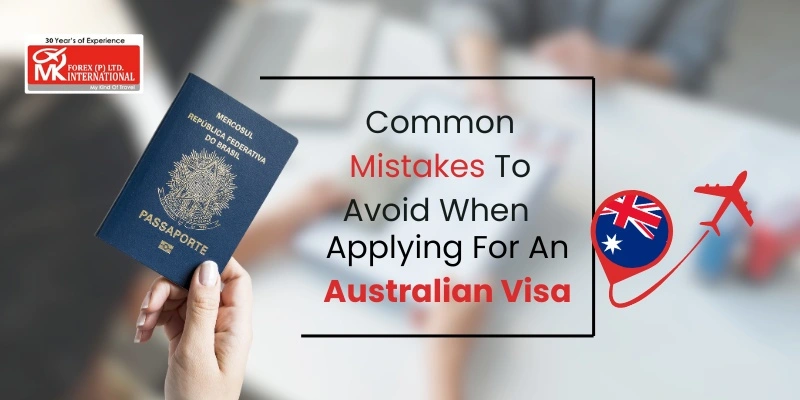1. Incomplete Or Incorrect Application Forms
One of the most common mistakes is submitting incomplete or incorrect application forms. Ensure that you fill out the visa application form accurately and completely. Double-check all information for accuracy, including personal details, travel history, and purpose of visit. Mistakes or omissions can lead to delays or even rejection of your visa application.
Tip: Use the online application system to fill out your form, as it often provides guidance and checks for errors. Review your application thoroughly before submission and consider having it checked by a professional if you’re unsure.
2. Missing Required Documentation
Failing to provide all the required documents is another frequent issue. Australian visa applications require specific documents depending on the type of visa you’re applying for. Common documents include passport copies, proof of financial means, travel itineraries, and employment verification.
Tip: Make a checklist of all required documents based on the visa type you are applying for. Ensure you gather and organize all necessary documents before starting the application process. Keep both digital and physical copies of your documents.
3. Inadequate Proof Of Financial Stability
One of the critical requirements for most Australian visas is proving your financial stability to ensure you can support yourself during your stay. Common mistakes include providing outdated bank statements or insufficient evidence of financial support.
Tip: Provide up-to-date and comprehensive proof of your financial situation. This can include recent bank statements, pay slips, and tax returns. Ensure your documentation clearly shows that you have sufficient funds for your stay in Australia.
4. Failure To Meet Health And Character Requirements
Australian visa applications often require health and character assessments. Failing to complete these assessments or not meeting the required standards can lead to visa refusals.
Tip: Provide up-to-date and comprehensive proof of your financial situation. This can include recent bank statements, pay slips, and tax returns. Ensure your documentation clearly shows that you have sufficient funds for your stay in Australia.
5. Not Understanding Visa Conditions And Requirements
Each Australian visa type has specific conditions and requirements. Not understanding these conditions can lead to mistakes that might affect your visa application or your stay in Australia.
Tip: Research and understand the conditions associated with the visa you are applying for. This includes knowing the permitted length of stay, work rights, and any other restrictions. Ensure that you comply with these conditions to avoid complications.
6. Applying For The Wrong Visa Type
Choosing the incorrect visa type for your purpose of travel can result in delays or rejection. It’s essential to apply for the visa that best matches your travel intentions, whether it’s for tourism, business, study, or migration.
Tip: Review the different visa categories and their requirements carefully. If you’re unsure about which visa to apply for, consider consulting with a migration agent or legal expert who can provide guidance based on your specific situation.
7. Submitting A Visa Application Close To The Travel Date
Applying for a visa too close to your planned travel date can be risky. Visa processing times can vary, and delays may occur, potentially causing you to miss your intended travel date.
Tip: Apply for your visa well in advance of your planned travel date. This allows ample time for processing and any additional steps that may be required. Generally, applying at least 2-3 months before your trip is advisable.
8. Ignoring Professional Advice
Navigating the Australian visa application process can be complicated, and some applicants may attempt to manage the process independently, leading to mistakes.
Tip: Consider seeking advice from a registered migration agent or consultant if you’re unsure about any aspect of your application. Professional guidance can help you avoid common pitfalls and ensure that your application is complete and accurate.
9. Failing To Update Application Status
If there are changes to your circumstances after you’ve submitted your application, such as a change in employment or contact details, failing to update this information can create problems.
Tip: Inform the Australian Department of Home Affairs of any changes to your personal circumstances promptly. Keeping your application details current ensures that there are no discrepancies that could affect the outcome of your visa application.
10. Not Preparing For The Visa Interview
For some visa types, an interview may be required. Being unprepared for the interview can lead to a negative outcome.
Tip: Prepare thoroughly for any potential visa interviews. Review your application, be ready to answer questions about your travel plans and financial situation, and ensure you provide honest and consistent answers.


